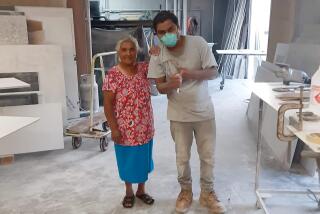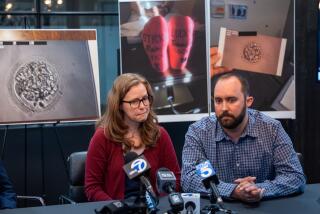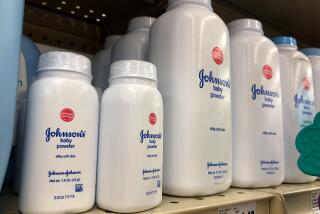Dow Chemical Dealt Defeat in Implant Trial
- Share via
A New Orleans jury hearing the nation’s first class-action lawsuit over silicone breast implants found Monday that Dow Chemical Co. knew that silicone was potentially harmful to humans and that it conspired with the major manufacturer of the devices to withhold safety data from women.
The verdict came in the first phase of a trial in which 1,800 Louisiana women have sued Dow Chemical claiming that silicone that leaked into their bodies from damaged implants caused a variety of debilitating ailments.
The Louisiana verdict is the third and biggest case to go against Dow Chemical in breast implant litigation and increases the likelihood that the company could face massive liability in the thousands of similar cases pending across the country.
The state court ruling will likely reignite debate over the use--and misuse--of science in the courtroom that is at the heart of the bitter controversy over breast implants. As companies have been hit with multimillion-dollar verdicts over their roles in the breast implant business, critics have lashed out at plaintiffs lawyers and juries for ignoring a growing body of scientific studies that have found no link between implants and disease.
“What we’ve learned today is that in spite of overwhelming scientific and medical evidence to the contrary, plaintiffs can get a verdict against a company that is baseless,” said Lorna Propes, an attorney for Dow Chemical.
But Ernie Hornsby, an Alabama attorney representing plaintiffs in the New Orleans trial, said the jury firmly rejected Dow Chemical’s contention that it had no part in the breast implant issue. He noted that jurors answered “yes” to all seven questions posed regarding Dow Chemical’s role in the testing of silicone gel and the suppression of safety data.
“Clearly, the jury unanimously felt that silicone implants are capable of causing harm,” Hornsby said. “From day one, there was an attempt to hide the real dangers of this product.”
Dow Chemical argued throughout the nearly six-month trial that it had no role in testing silicone safety for use in human implants and never manufactured breast implants. It said the companies which did make implants--including Dow Corning, 50% owned by Dow Chemical--contracted with other companies for safety testing. Dow Corning was once the leading implant maker.
*
But plaintiffs attorneys argued that Dow Chemical itself conducted extensive testing on silicone fluids as far back as the 1940s and that Dow Corning relied on those tests when it began selling implants in the 1960s. The plaintiffs contended that Dow Chemical withheld information about the possible safety hazards.
Faced with thousands of breast implant lawsuits, Dow Corning sought protection by filing for bankruptcy in 1994, which effectively froze most of the lawsuits against it. Since then, attorneys representing women who claim illnesses from implants have been pressing their claims against Dow Chemical.
In late 1995, a jury in Reno, Nev., handed down a $14.1-million verdict against Dow Chemical in the first such award against the company. That case, which is being appealed by the company, involved only a single plaintiff. In several other states, including California, judges have ruled that Dow Chemical cannot be held liable in breast implant cases because it never manufactured the products.
The New Orleans trial involves only a small number of the thousands of lawsuits filed against implant companies since 1992, when the Food and Drug Administration imposed a temporary moratorium on silicone implants. Saline implants are still available.
Dow Corning, which is attempting to complete a bankruptcy reorganization, has proposed a mass settlement in which it would pay $600 million to women with claims stemming from ruptured implants and as much as $1.6 billion to resolve disease claims if it loses a science trial to determine if implants actually cause disease.
While Dow Chemical lawyers expressed confidence that the company would prevail in the second phase of the four-phase New Orleans trial, they conceded that the ruling opens the company to a significant liability risk in the more than 13,000 other pending suits.
*
“I believe any time you have a finding of a jury that is so grossly unsupported in fact and law that, yes, unfortunately, it makes every company in America more vulnerable to class-action litigation,” said Propes.
Lawyers for plaintiffs speculated that if Dow Chemical cannot overturn the Louisiana verdict on appeal, it could be forced--like Dow Corning--to seek a mass settlement of claims against it.
In the second phase of the trial, due to start next month, the jury will be asked to decide whether the implants caused the health problems suffered by the eight women who are representing the 1,800 plaintiffs.
Plaintiffs lawyers said the jury’s ruling about Dow Chemical’s liability bodes well for their side as the trial continues. They noted that jurors heard several weeks of evidence from medical experts--most of them called by Dow’s lawyers--about the possible link between implants and connective-tissue diseases, such as lupus and scleroderma.
Moreover, Hornsby noted that none of the women who are claiming injuries were allowed by the judge to give testimony during the trial’s first phase. Referring to previous trials, he said: “We’ve faced criticism before that the jurors ruled for us only out of sympathy to the damaged women,” but that wasn’t the case this time.
*
In remarks at a press conference, Dow Chemical’s Propes conceded that the jury’s ruling “feels like a total rejection of our position.” But she quickly allowed that it is possible that jurors could have ruled against Dow Chemical while still “following our reasoning about the science.”
“In phase two, these jurors will have to hear strong, persuasive evidence that these eight women have something wrong with them due to their implants,” Propes said. “They might be shocked at how little evidence they hear.”
Many researchers and regulators have dismissed women’s claims that silicone breast implants have caused disease. Major studies at Harvard University, the Mayo Clinic and several other institutions have found that women with implants were no more likely to suffer from immune system, connective tissue or other diseases than women without implants.
Plaintiffs attorneys have faulted those studies, arguing that women are not suffering from classic immune system disease, but rather from atypical diseases that would not be picked up in those studies.
Last year, a judge in Oregon overseeing breast implant litigation barred experts from testifying, noting that the notion of a new disease was “at best a hypothesis.”
But a study published last year in the international medical journal Lancet suggested that there may be a link between implants and disease. The study found that in a survey of 95 women with implants, a particular antibody produced in response to leaking silicone was much more common among women with serious illnesses than among those with milder symptoms.
*
Lawyers for Dow Chemical said they may appeal Monday’s verdict after the completion of the trial. They contend that the judge erred when certifying the case as a class action and that plaintiffs lawyers engaged in improper conduct.
In mid-July, Louisiana State Judge Yada Magess dismissed the case after three months of trial, ruling that plaintiffs attorney Tom Pirtle had committed “prejudicial misconduct” by making gestures and nonverbal communications with jurors. Several days later, and after polling jurors, the judge reversed herself and allowed the trial to proceed.
More to Read
Inside the business of entertainment
The Wide Shot brings you news, analysis and insights on everything from streaming wars to production — and what it all means for the future.
You may occasionally receive promotional content from the Los Angeles Times.










